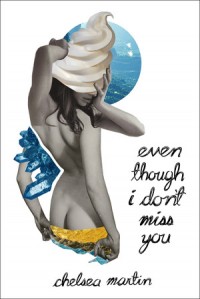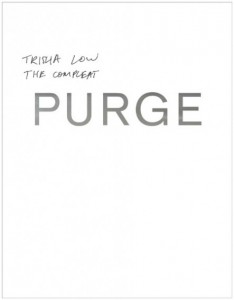 |
Even Though I Don’t Miss You
by Chelsea Martin
Short Flight/Long Drive Books, 2013
|
1. In this book, Chelsea Martin reminds me of my girlfriend. She reminds of all my ex-girlfriends, she reminds me of everybody’s girlfriend. It’s hard to pinpoint why. Is she the essence of contemporary girlfriendness?
2. It provides an insight sometimes into particular shades of emotion that I don’t necessarily seem to understand (not that I want to get all ‘Men are from Mars, etc ’ or some such popular-silliness about this point).
3. Other times, it’s nice to know that I’m not entirely wrong in my assumptions about ‘What might be wrong?’, ‘When something might be wrong?’
4. I have to declare an interest and that is that I’m not really in a relationship with Chelsea Martin but this book feels so much like being in a relationship as much from a male as from a female perspective that I can’t help but think that I am and that this qualifies it as a great success in that department.
5. “There is a piece of clothing thrown on the floor in the shape of what I look like to myself”. This is a beautiful, economical image; an everyday occurrence raised to something just v profound. I imagine it to be a denim skirt for some reason.
6. It reminds me of a line from an e-book, by someone, an old free e-book by someone, possibly Richard Brammer that I can’t find at the moment (maybe I imagined it) about ‘Your bra will fade on the radiator just like the rest.’ Any ideas?
7. The sentence that many reviewers have picked from this book is worth repeating in full:
“Being in a relationship for a very long time feels just like being single except that I can’t remember the last time that I was alone for five hours.”
This has the same periphrastic quality as that which I discussed in relation to Spencer Madsen (elsewhere in a 25 Points Review for HTMLGIANT). It’s almost like a really good, lengthy title appended to a very successful piece of conceptual art. I can see why so many reviewers chose to pick it out.
8. The relationship theme is undercut throughout with the many conversations between the ‘I’ and the ‘You.’ Often humorous, sometimes sad, occasionally refreshingly absurd, like a transcription of direct speech really is. See – this is what I meant in points 1-4.
9. Again, and in relation to a Spencer Madsen review that I have just written and so which is fresh in my mind but which might as well be seen as a recurring theme, a necessarily recurring theme, of all contemporary literature, that of the wide-open spaces of potential for metaphor, analogy, etc., when it comes to everyday technological digital life, a relatively fresh opportunity ripe for figuration, Chelsea’s line: “I feel like everything I write could be mistaken for theory about Adobe Photoshop’s Clone Stamp Tool” takes some beating. Apologies, that was an awful sentence, I wrote it backwards.
10. I don’t think I’m going to apologise for mentioned other writers in these reviews. Everything has a context, right.



 The Compleat Purge
The Compleat Purge
 The No World Concerto
The No World Concerto The girl’s novel follows the story of an aging Alien-hunter.
The girl’s novel follows the story of an aging Alien-hunter.